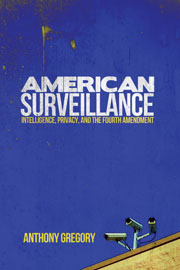A bill essentially legalizing Bush’s warrantless surveillance program just sailed through the Democratic House and is expected to sail through the Democratic Senate. It would expand wiretapping powers against foreign targets, extend the grace period of warrantless domestic eavesdropping on Americans at home, and grant retroactive immunity to telecom companies that cooperated in illegal domestic spying. The New York Times calls it “the most significant revision of surveillance law in 30 years,” but it is also just the latest example in 30 years of Democratic betrayals of the Fourth Amendment.
In 1978, Democratic President Carter signed the Foreign Intelligence Surveillance Act into law. A meager response to Nixon’s surveillance of peaceful activists and other such abuses, FISA established a secret court within the Justice Department to issue special warrants for wiretapping foreign suspects. Even when spying on a “United States person,” intelligence officials now had 72 hours before they needed a warrant. Carter said in his signing statement, “This is a difficult balance to strike, but the act I am signing today strikes it.” The Fourth Amendment lost its teeth.
From 1979 to September 11, 2001, more than thirteen thousand FISA warrants were issued. Not a single application was rejected.
But that wasn’t enough for Bush. He demanded the Patriot Act, which amended FISA to widely expand executive spying powers and weaken judicial review. FISA had obstructed intelligence gathering before 9/11, we were told. (But the real problem was ineptitude—for example, the FBI in the weeks before 9/11 had legitimate cause to search “twentieth hijacker” Zacarias Moussaoui’s computer, but FBI agents misunderstood the FISA process and blew the opportunity.)
Intimidated by the administration in October 2001, the Democrats—including all but one senator—voted for the Patriot Act. They gave the president what he said he needed, on top of the rubberstamping FISA process he already had, to protect America.
But that was still not enough for Bush. In December 2005, we learned that the president had secretly ordered the National Security Agency, a military intelligence organ of the Defense Department, to ignore FISA and wiretap calls within the United States. Upon this revelation, Congressional Democrats complained they weren’t consulted about the program. Bush’s defenders responded he had this unilateral warrantless spying power as “commander in chief,” or due to Congress’s post-9/11 authorization of military force, or just because it was an “inherent” executive prerogative going back to George Washington.
In January 2007, the Democrats retook the House and Senate with a mandate to curb Bush’s domestic and foreign abuses in the War on Terror.
And now the Democratic leadership and almost half the Democrats in Congress have codified Bush’s brazen, extrajudicial surveillance policy into law and given retroactive immunity to those companies that illegally cooperated with the NSA. Missouri Republican Senator Christopher Bond, who led this legislative “compromise,” says, “the White House got a better deal than even they had hoped to get.”
This Congress has outdone the last one in encouraging Bush’s surveillance power grabs. As Salon.com civil liberties expert Glenn Greenwald notes, “in 2006, when the Congress was controlled by [Republicans] Bill Frist and Denny Hastert, the administration tried to get a bill passed legalizing warrantless eavesdropping and telecom amnesty, but was unable. They had to wait until the Congress was controlled by [Democrats] Steny Hoyer, Nancy Pelosi and Harry Reid to accomplish that.”
Some Democrats dissent. Wisconsin’s Russ Feingold, the lone senator to vote against the Patriot Act, calls the new bill a “capitulation.” Senator Barack Obama, in contrast, expresses superficial misgivings but assures us this “compromise” preserves substantial judicial oversight. “Given the legitimate threats we face, providing effective intelligence collection tools with appropriate safeguards is too important to delay,” the presidential candidate says, pledging that once in the White House he “will carefully monitor the program . . . and work with the Congress to take any additional steps [he deems] necessary to protect the lives—and the liberty—of the American people.”
But that isn’t enough for America. The point of judicial oversight is we can’t, and shouldn’t have to, trust the executive branch.
FISA created too many loopholes in the Fourth Amendment. The litany of unspeakable surveillance abuses under this and past administrations (both Republican and Democratic) and the executive’s tendency to defy even the flimsiest safeguards suggest that Americans serious about civil liberties should hold their representatives to a higher standard and bolder agenda: repeal this last monstrosity, scrap the Patriot Act, and give FISA itself the axe.
America’s founding generation had just lost twenty-five thousand men in a gruesome war against the British Empire when they crafted the Bill of Rights. Despite their dangerous world, they saw no need for wartime exceptions to the Fourth Amendment. And neither should we.








